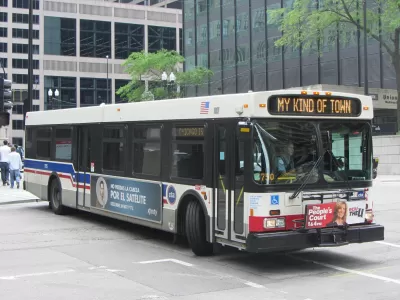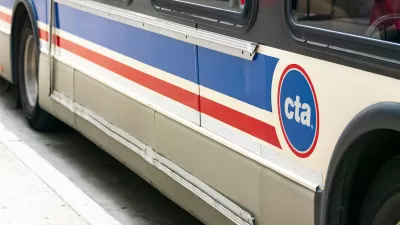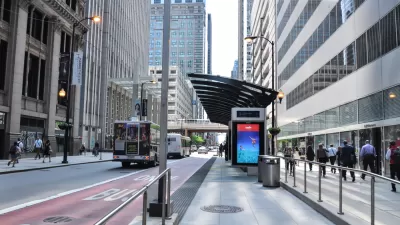The Central Loop BRT project, scheduled to break ground this month, will improve commuter travel times. But a collection of compromises means many ideal BRT components won't be installed.

Eric Jaffe writes that while Chicago's upcoming Central Loop BRT corridor will benefit travelers, the pro-bus community isn't wholly satisfied with compromises made. "Several design elements of top-notch BRT are missing from the Central Loop project. Only one of the eight stops will have off-board fare payment when the system launches. The Windy City has passed on weather-enclosed train-style stations for open bus shelters. The buses will lack camera-enforcement for exclusive lanes and even lose that exclusivity for a block."
Concern among bus supporters extends to the planned Ashland corridor, a more ambitious BRT project. "They share a general fear that skimping on core BRT elements could compromise the project and make it harder to gain public support later on for service expansions or improvements. Such concerns have left some BRT advocates wondering if Chicago is in danger of failing to become the American model of world-class bus service."
A long-term parking revenue deal also means Chicago cannot redesign its streets freely. "For a one-time fee of $1.15 billion—most of it spent immediately filling budget deficits—Chicago leased its parking spaces, and the meter revenue that comes with them, to Morgan Stanley for the next 75 years."
Jaffe concludes on a positive note: "A final point in the plus column: whatever compromises the Central Loop BRT has endured is in many ways a product of the very public feedback system cities have demanded."
FULL STORY: The Cracks in Chicago's Grand Plans for the Bus

Planetizen Federal Action Tracker
A weekly monitor of how Trump’s orders and actions are impacting planners and planning in America.

Restaurant Patios Were a Pandemic Win — Why Were They so Hard to Keep?
Social distancing requirements and changes in travel patterns prompted cities to pilot new uses for street and sidewalk space. Then it got complicated.

Maui's Vacation Rental Debate Turns Ugly
Verbal attacks, misinformation campaigns and fistfights plague a high-stakes debate to convert thousands of vacation rentals into long-term housing.

In California Battle of Housing vs. Environment, Housing Just Won
A new state law significantly limits the power of CEQA, an environmental review law that served as a powerful tool for blocking new development.

Boulder Eliminates Parking Minimums Citywide
Officials estimate the cost of building a single underground parking space at up to $100,000.

Orange County, Florida Adopts Largest US “Sprawl Repair” Code
The ‘Orange Code’ seeks to rectify decades of sprawl-inducing, car-oriented development.
Urban Design for Planners 1: Software Tools
This six-course series explores essential urban design concepts using open source software and equips planners with the tools they need to participate fully in the urban design process.
Planning for Universal Design
Learn the tools for implementing Universal Design in planning regulations.
Heyer Gruel & Associates PA
JM Goldson LLC
Custer County Colorado
City of Camden Redevelopment Agency
City of Astoria
Transportation Research & Education Center (TREC) at Portland State University
Camden Redevelopment Agency
City of Claremont
Municipality of Princeton (NJ)




























